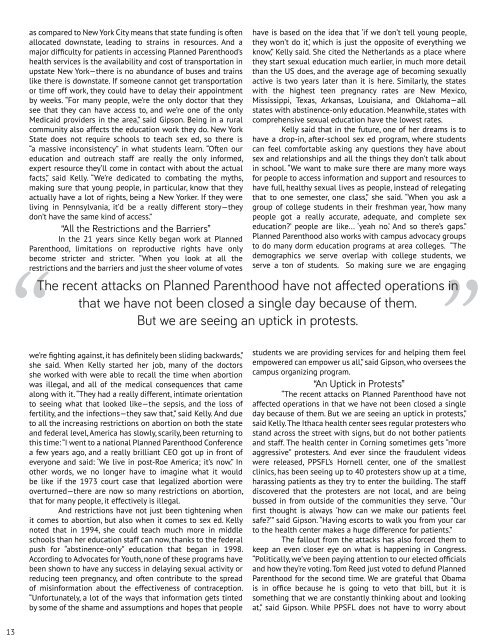Kitsch Magazine: Fall 2015
Binaries
Binaries
- No tags were found...
Create successful ePaper yourself
Turn your PDF publications into a flip-book with our unique Google optimized e-Paper software.
as compared to New York City means that state funding is often<br />
allocated downstate, leading to strains in resources. And a<br />
major difficulty for patients in accessing Planned Parenthood’s<br />
health services is the availability and cost of transportation in<br />
upstate New York—there is no abundance of buses and trains<br />
like there is downstate. If someone cannot get transportation<br />
or time off work, they could have to delay their appointment<br />
by weeks. “For many people, we’re the only doctor that they<br />
see that they can have access to, and we’re one of the only<br />
Medicaid providers in the area,” said Gipson. Being in a rural<br />
community also affects the education work they do. New York<br />
State does not require schools to teach sex ed, so there is<br />
“a massive inconsistency” in what students learn. “Often our<br />
education and outreach staff are really the only informed,<br />
expert resource they’ll come in contact with about the actual<br />
facts,” said Kelly. “We’re dedicated to combating the myths,<br />
making sure that young people, in particular, know that they<br />
actually have a lot of rights, being a New Yorker. If they were<br />
living in Pennsylvania, it’d be a really different story—they<br />
don’t have the same kind of access.”<br />
“All the Restrictions and the Barriers”<br />
In the 21 years since Kelly began work at Planned<br />
Parenthood, limitations on reproductive rights have only<br />
become stricter and stricter. “When you look at all the<br />
restrictions and the barriers and just the sheer volume of votes<br />
have is based on the idea that ‘if we don’t tell young people,<br />
they won’t do it,’ which is just the opposite of everything we<br />
know,” Kelly said. She cited the Netherlands as a place where<br />
they start sexual education much earlier, in much more detail<br />
than the US does, and the average age of becoming sexually<br />
active is two years later than it is here. Similarly, the states<br />
with the highest teen pregnancy rates are New Mexico,<br />
Mississippi, Texas, Arkansas, Louisiana, and Oklahoma—all<br />
states with abstinence-only education. Meanwhile, states with<br />
comprehensive sexual education have the lowest rates.<br />
Kelly said that in the future, one of her dreams is to<br />
have a drop-in, after-school sex ed program, where students<br />
can feel comfortable asking any questions they have about<br />
sex and relationships and all the things they don’t talk about<br />
in school. “We want to make sure there are many more ways<br />
for people to access information and support and resources to<br />
have full, healthy sexual lives as people, instead of relegating<br />
that to one semester, one class,” she said. “When you ask a<br />
group of college students in their freshman year, ‘how many<br />
people got a really accurate, adequate, and complete sex<br />
education?’ people are like... ‘yeah no.’ And so there’s gaps.”<br />
Planned Parenthood also works with campus advocacy groups<br />
to do many dorm education programs at area colleges. “The<br />
demographics we serve overlap with college students, we<br />
serve a ton of students. So making sure we are engaging<br />
“ ”<br />
The recent attacks on Planned Parenthood have not affected operations in<br />
that we have not been closed a single day because of them.<br />
But we are seeing an uptick in protests.<br />
we’re fighting against, it has definitely been sliding backwards,”<br />
she said. When Kelly started her job, many of the doctors<br />
she worked with were able to recall the time when abortion<br />
was illegal, and all of the medical consequences that came<br />
along with it. “They had a really different, intimate orientation<br />
to seeing what that looked like—the sepsis, and the loss of<br />
fertility, and the infections—they saw that,” said Kelly. And due<br />
to all the increasing restrictions on abortion on both the state<br />
and federal level, America has slowly, scarily, been returning to<br />
this time: “I went to a national Planned Parenthood Conference<br />
a few years ago, and a really brilliant CEO got up in front of<br />
everyone and said: ‘We live in post-Roe America; it’s now.” In<br />
other words, we no longer have to imagine what it would<br />
be like if the 1973 court case that legalized abortion were<br />
overturned—there are now so many restrictions on abortion,<br />
that for many people, it effectively is illegal.<br />
And restrictions have not just been tightening when<br />
it comes to abortion, but also when it comes to sex ed. Kelly<br />
noted that in 1994, she could teach much more in middle<br />
schools than her education staff can now, thanks to the federal<br />
push for “abstinence-only” education that began in 1998.<br />
According to Advocates for Youth, none of these programs have<br />
been shown to have any success in delaying sexual activity or<br />
reducing teen pregnancy, and often contribute to the spread<br />
of misinformation about the effectiveness of contraception.<br />
“Unfortunately, a lot of the ways that information gets tinted<br />
by some of the shame and assumptions and hopes that people<br />
students we are providing services for and helping them feel<br />
empowered can empower us all,” said Gipson, who oversees the<br />
campus organizing program.<br />
“An Uptick in Protests”<br />
“The recent attacks on Planned Parenthood have not<br />
affected operations in that we have not been closed a single<br />
day because of them. But we are seeing an uptick in protests,”<br />
said Kelly. The Ithaca health center sees regular protesters who<br />
stand across the street with signs, but do not bother patients<br />
and staff. The health center in Corning sometimes gets “more<br />
aggressive” protesters. And ever since the fraudulent videos<br />
were released, PPSFL’s Hornell center, one of the smallest<br />
clinics, has been seeing up to 40 protesters show up at a time,<br />
harassing patients as they try to enter the building. The staff<br />
discovered that the protesters are not local, and are being<br />
bussed in from outside of the communities they serve. “Our<br />
first thought is always ‘how can we make our patients feel<br />
safe?’” said Gipson. “Having escorts to walk you from your car<br />
to the health center makes a huge difference for patients.”<br />
The fallout from the attacks has also forced them to<br />
keep an even closer eye on what is happening in Congress.<br />
“Politically, we’ve been paying attention to our elected officials<br />
and how they’re voting. Tom Reed just voted to defund Planned<br />
Parenthood for the second time. We are grateful that Obama<br />
is in office because he is going to veto that bill, but it is<br />
something that we are constantly thinking about and looking<br />
at,” said Gipson. While PPSFL does not have to worry about<br />
13




